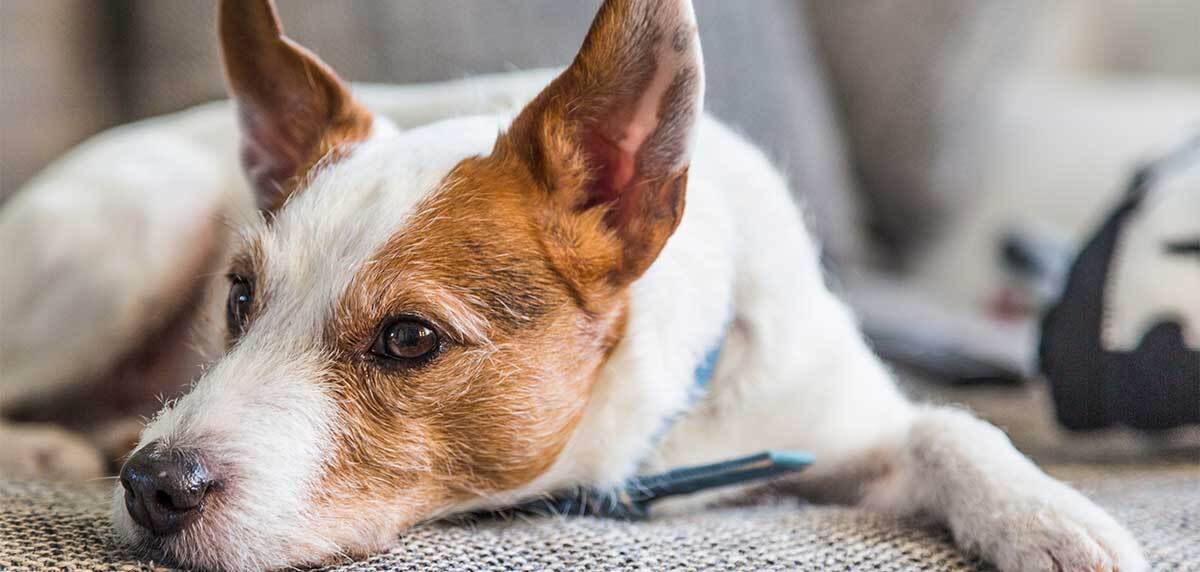Kennel cough – symptoms, treatment and prevention
01.01.2024 - Reading time: 6 minutes

If kennel cough is not recognised in time, it can lead to complications. It is therefore important to know the symptoms.
Kennel cough is a disease which can lead to complications if it is not detected in time. The kennel cough vaccine helps prevent this respiratory disease. Knowing the symptoms of kennel cough means you can act quickly to protect your faithful friend from any adverse affects. As its name suggests, it spreads quickly when dogs live in a community.
How is kennel cough caught?
A variety of pathogens can cause infectious tracheobronchitis:
- The canine parainfluenza virus (CPIV): present in dogs‘ nasal and oral secretions for up to two weeks after infection, this virus is highly contagious.
- Bordetella bronchiseptica (Bb) infection: still present in the dog’s respiratory tract when symptoms have disappeared; may also be excreted by the infected animal.
- Canine adenovirus types 1 and 2 (CAV-1 and CAV-2): cause respiratory diseases, but are rarer thanks to vaccination.
Other viruses, such as reovirus and other bacteria, are often involved in kennel cough symptoms. These are more serious and more difficult to treat in cases of contamination by several pathogens, such as Bordetella bronchiseptica and canine parainfluenza virus.
How does kennel cough spread?
The name of the disease says a lot about how it is transmitted. Dogs that are in contact with a large number of other dogs are most at risk of catching it. That’s why it occurs most often in kennels, shelters, breeding farms and boarding kennels. Dogs taking part in shows and group training courses are also more at risk of falling ill with kennel cough. It is transmitted by air and by close contact. This is the case, for example, when you take your dog for a walk and they meet another dog. If they greet each other nicely by touching noses, it might be cute, but not always good for their health. Given that some of the pathogens are resistant to external conditions, contamination by objects such as bowls or toys is also possible. Although kennel cough affects dogs of all ages, puppies, older dogs and dogs with poor health are particularly vulnerable. The incubation period for the disease is three to ten days, during which time the dog may show no symptoms, but will already be contagious. You may be wondering: When a dog has kennel cough, how long are they contagious for? Generally during the first two weeks, but if infected with Bordetella bronchiseptica, the transmission period could extend to three months. Your vet will give you all the information you need to prevent your dog spreading the disease to other dogs. When making an appointment for your canine companion, be sure to outline their symptoms. As you don’t yet know whether they have kennel cough, you must absolutely prevent them from coming into contact with other dogs. A vet’s waiting room is therefore not ideal and you may be asked to wait outside or to come outside of the usual opening hours. There is no risk to humans, as kennel cough is not a zoonosis.
Kennel cough – the symptoms
Kennel cough is sometimes referred to as “canine whooping cough”, because its symptoms are similar to those of whooping cough in humans. Dogs with kennel cough have a hoarse, loud cough, sometimes so violent that it causes them to vomit. Some owners therefore think their faithful friend has something stuck in their throat. The dog may sneeze, feel less hungry and be very tired. Another symptom of kennel cough is a more or less severe and sometimes purulent nasal discharge, which should prompt you to make an appointment with your vet as soon as possible. They will easily recognise kennel cough and prescribe the treatment your four-legged friend needs. Blood tests and a chest X-ray will confirm the diagnosis and prevent any complications. The length of time kennel cough last for varies depending on the pathogen, the age of your dog, their state of health and complications, such as a secondary infection.

How do you treat kennel cough in dogs?
Even if kennel cough is not fatal for dogs in good health, coughing fits will tire them out and cause them to suffer. A visit to your vet and appropriate treatment will increase the chances of a relatively rapid recovery for your faithful friend. The medication prescribed by the vet may be:
- Antibiotics if the cough is caused by a bacterial infection
- Anti-inflammatory medication to reduce inflammation and irritation
- Cough medicine to prevent coughing fits
The treatment will last for around one week, sometimes more depending on the severity of the symptoms. Do not stop giving your dog medication prescribed by the vet even if your little furball is already feeling much better. This could lead to a relapse and the need for longer-term medication. The price of treatment for kennel cough depends on the medication prescribed and the tests carried out. Some veterinary clinics offer payment plans. So don’t hesitate to raise the subject if your dog falls ill and you’re struggling financially at the end of the month. Do not give medication intended for humans to your dog. These are often toxic for them. Self-medication risks aggravating your canine friend’s symptoms and illness, and even putting their life in danger.
How can you treat kennel cough naturally?
Many natural remedies will help to relieve your little companion if they are coughing a lot and visibly suffering.
If your dog is taking medication prescribed by your vet, get their advice before using these home remedies:
- Honey: in this particular case, the same thing that’s good for humans is also good for your dog. Honey has anti-inflammatory and antibacterial properties. What’s more, most dogs love it so simply add it to a treat or their daily food. But be careful if your canine companion suffers from diabetes! Your vet will tell you whether or not honey is contraindicated. Puppies less than one year old should not eat honey either.
- Coconut oil: this tropical oil has antibacterial, antiviral and antifungal properties. It helps to strengthen your poorly dog’s immune system. The amount you should add to your dog’s food depends on their weight. It’s best to start with small amounts, such as a quarter teaspoon, and look out for any side effects, such as diarrhoea.
- Fresh air in your home: remember to air your home regularly, and if the air is too dry, a humidifier or vaporiser will relieve your little pet. Keep the room where your dog sleeps as dust-free as possible.
- Give them wet food: a bad cough can irritate the throat. This means biscuits will be harder to swallow.
As well as healthy, natural remedies, your dog needs peace and quiet. Sick dogs usually sleep more and look for a quiet corner in the house on their own. If you have young children, tell them that your faithful friend is sick and needs to rest. They’ll be able to play together again when the dog is back to full health.
The kennel cough vaccine
Several vaccines work against kennel cough. Some are already included in vaccinations against the main dog diseases: parvovirosis, leptospirosis and distemper. An additional vaccine against parainfluenza virus and Bordetella bronchiseptica bacteria can be injected or administered via the nasal passage. The latter involves the liquid content of the vaccine being inserted into the dog’s nose, and immunity begins to develop three to five days later. One single administration is all that is needed for primary vaccination, with an annual booster. A mild reaction may occur with this type of vaccine, such as a runny nose. If you want to take your dog to a boarding kennel for a few days, or even a few weeks, you’ll probably be asked to have your little friend vaccinated against kennel cough. The same applies to dog shows and competitions. Vaccinated dogs are not fully protected against kennel cough, but if they are infected, their symptoms will be much less severe. The price of the vaccine is not high, but varies from one veterinary clinic to another. If you have a puppy, they can be vaccinated from six weeks old.
Although the symptoms of kennel cough are sometimes quite severe, keep your cool and concentrate on your dog’s well-being. Complications are rare and with the right treatment, your faithful friend will soon be back to full health.


